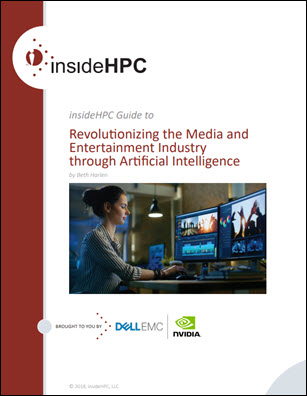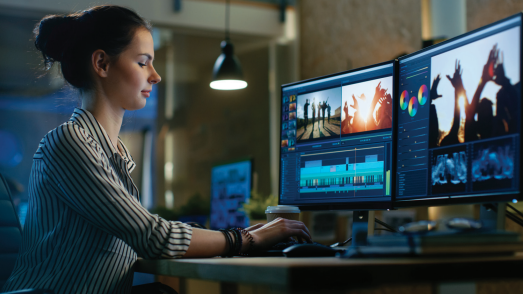This insideHPC guide series explores how artificial intelligence is revolutionizing and evolving the media and entertainment industries. To get things started, this post offers up an overview of how AI is impacting the entertainment industry and the future of these sectors.

Download the full report.
The media and entertainment landscape is changing. From the creative process behind the scenes, to content delivery and audience engagement, artificial intelligence (AI) is having a profound effect on the industry. Imagine a future where computer-generated movie characters blend in seamlessly with their human counterparts. Where gait, emotional expression, and even musculature are intuitive and so life-like that audiences don’t have to suspend their disbelief – it simply won’t be there to begin with.
Or imagine developing a video game where the opponent actively learns from and adapts to the player’s personal style of play. Where storylines change and character responses become less predictable. And imagine creating and delivering personalized content, reducing time, cost and effort during post-production, and boosting audience engagement and conversion rates. This is the age of artificial intelligence.
As a term, ‘artificial intelligence’ has been in the public consciousness since the 1950s but only now is its true potential being realized. Over the past five years or so, technological breakthroughs, the mainstreaming of high-performance computing, and the explosion of data generation and capture, have all converged to empower AI. And this is revolutionizing the way people generate, curate, and engage with content — a significant point given that in media and entertainment, content is all. AI began with the idea that computers could simulate human intelligence, problem-solving, and adaptability.
That idea began to take shape with machine learning, a subclass of AI whereby a computer processes vast amounts of data in order to begin to discern patterns, make predictions, and for all intents and purposes ‘learn’. Take that one step further by removing the need to physically input parameters for what the computer should be trying to recognize, and we arrive at deep learning. In essence, machine and deep learning are the technologies that underpin AI and make it possible.
From the creative process behind the scenes, to content delivery and audience engagement, artificial intelligence is having a profound effect on the industry.
Further in this guide, we’ll explore the specific applications of machine and deep learning in media and entertainment, the technologies you need to know about, and the resources and expertise on-hand to offer guidance. Whether you’re beginning to explore content generation behind the camera, or looking for new ways to engage with, capture, and retain new audiences, this guide is the best place for you to start.
Stay tuned; this insideHPC guide series will also cover the following aspects of AI in the media industry over the next few weeks:
- Finding a solution
- The result
- What next?
Download the full report, “Revolutionizing the Media and Entertainment Industry through Artificial Intelligence,” courtesy of Dell EMC and Nvidia, to learn more about how AI is impacting the media and entertainment industry.




